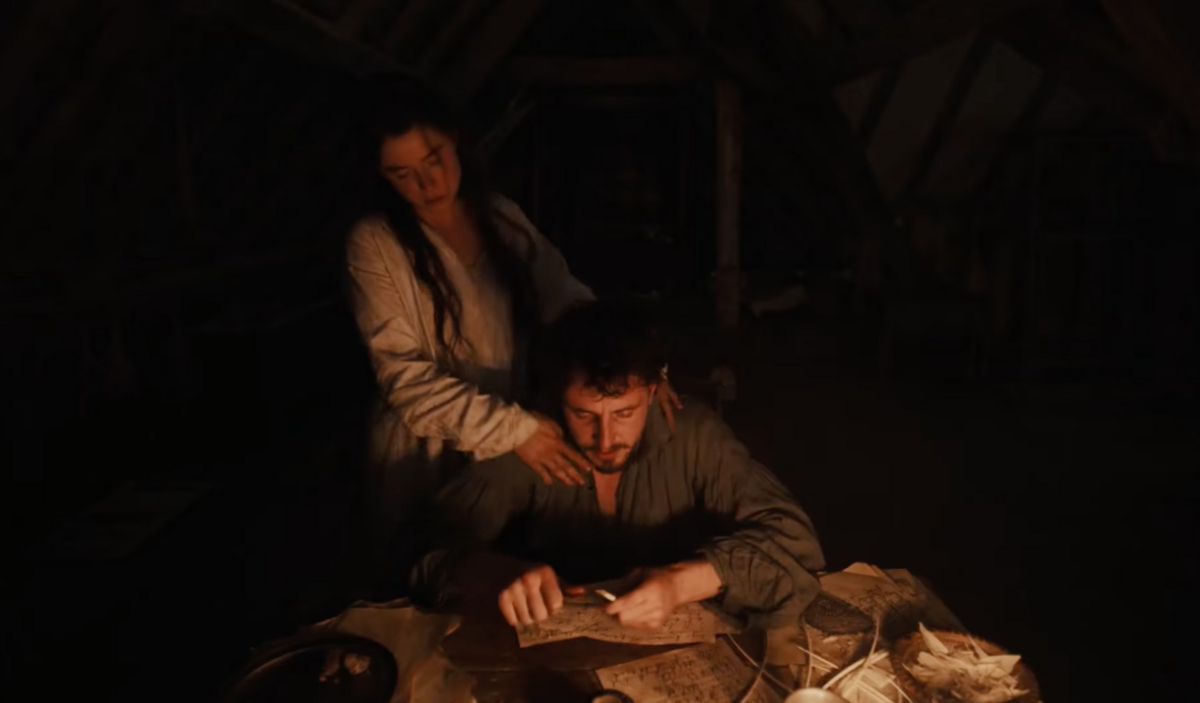‘Hamnet’ Review: Jessie Buckley Shatters the Heart in Chloé Zhao’s Masterwork of Grie
Focus Features
A devastating, career-defining achievement, led by Jessie Buckley’s most emotionally shattering performance yet.
There is a particular kind of grief that refuses to sit still — a grief that changes shape each time it’s confronted, stretching into silence, memory, ritual, rage. Chloé Zhao’s Hamnet is a film shaped entirely by that restless ache. It is not simply an adaptation of Maggie O’Farrell’s novel; it is a cinematic excavation of what happens to a family when the world cracks in half, when the unimaginable rips through the fabric of daily life, and when the person left standing must learn how to live in that space. It is Zhao’s most ambitious and most emotionally precise work — a film that moves like breath, like wind, like the shifting seasons that define its world.
Jessie Buckley, in what may ultimately become the defining performance of her career, plays Agnes Hathaway, the wife of William Shakespeare. But Hamnet refuses to let Shakespeare’s myth absorb her. Instead, Zhao gives Agnes a gravity rarely afforded to historical women on screen — the gravity of a person whose emotional intelligence, instincts, and pain become the film’s primary light source. Buckley’s presence is elemental; her grief does not play like a performance but like a natural phenomenon. The scenes following her son's death vibrate with an unspoken terror, the kind that refuses to let a single tear fall because collapsing would be too final, too real, too irreversible. The restraint is not distance — it is survival.
Focus Features
Opposite her, Paul Mescal gives one of his quietest, most lived-in performances yet. His Shakespeare is not the towering literary monolith we’re accustomed to. Here, he is a man rotting from the inside out — hollowed by guilt, by ambition, by the shame of having failed as a husband and father. Mescal’s stillness becomes the film’s secret weapon; he is all tremor and withheld emotion, a man who recognizes that the art he creates cannot replace what he has lost. Mescal gives the character something Shakespeare himself never had: the space to mourn as a father, not a legend.
Zhao situates Hamnet in a world where the natural environment is more than backdrop — it is character, memory, and mirror. Her landscapes are not the sweeping vistas of The Rider or Nomadland; instead, they are claustrophobic in their own way. Dense forests, empty fields, narrow cottage hallways — each frames Agnes’s grief as something she cannot escape. Nature does not console her; it absorbs her anguish, holds it, reflects it. Zhao uses dust, wind, firelight, and shadow the way other filmmakers use dialogue. You understand the characters less by what they say and more by what the world around them refuses to hide.
One of the film’s most powerful choices is its relationship to time. Hamnet does not unfold in a neat timeline. Memory ruptures the present. The past interrupts the future. Agnes drifts between moments, sometimes fully aware, sometimes pulled by a grief she cannot resist. Zhao treats time the way grief treats time — mercilessly, relentlessly. Scenes merge, collapse, repeat. The result is a film that feels haunted not by ghosts but by the permanence of loss.
And yet, for all its despair, the film never slips into misery. Zhao is too intuitive a filmmaker to let pain eclipse meaning. Each moment of sorrow is balanced by texture: hands in grain, a child’s laughter echoing through a corridor, candlelight brushing a face, the gentle movement of fabric. These details remind you that the world continues even after the worst happens — and perhaps Agnes’s greatest tragedy is that she must learn to continue too, even when her son cannot.
Jessie Buckley In Hamnet - AGATA GRZYBOWSKA/FOCUS FEATURE
Buckley’s performance hits its climax in a scene that lasts just moments but carries the weight of the entire film: Agnes, sitting alone, staring into the darkness, realizing that grief has changed the shape of her very identity. Buckley does not cry, scream, or break. She simply breathes — and in that breath, you feel everything she has lost. It is acting that transcends technique; it is embodied, lived, felt. This is what awards bodies talk about when they speak of work that “lingers.”
Mescal, too, reaches his own shattering apex late in the film when Shakespeare confronts the truth that his writing cannot resurrect what he has lost. It is a confrontation between art and life, myth and reality, performance and truth — and Mescal plays it not with grandeur but with honesty. If Buckley’s grief burns outwards, his sinks inwards, disappearing into a well of guilt so deep it seems impossible to climb out of.
Focus Features
The film’s final stretch is among Zhao’s finest work. The decision to integrate the writing of “Hamlet” — Shakespeare’s most famous meditation on grief — is executed with astonishing restraint. Instead of sermonizing or intellectualizing the connection, Zhao turns it into an emotional echo. The writing is not triumph; it is a last, desperate attempt to name the unnameable. When Agnes finally sees the play performed, her face becomes the only reaction that matters. You watch Buckley absorb the realization that their private grief has been transformed — maybe distorted, maybe immortalized — for the world. It's the closest the film comes to catharsis, but even that is complicated, uneasy, unfinished.
Ultimately, Hamnet is not “about” Shakespeare. It is about the person history left behind. It is about the cost of genius on the women who tethered the men who carried it. It is about the way families survive loss not by reckoning with it, but by living around it. Zhao’s refusal to melodramatize grief is what makes the film so devastating. The restraint is the devastation. The quiet is the wound.
POPULAR ON THE CINEMA GROUP
In a year dominated by loud campaigns, glossy biopics, maximalist musicals, and cultural juggernauts, Hamnet stands apart — not because it is smaller, but because it is deeper. It asks more of you. It trusts you to sit with pain long enough to understand it. It is a film that refuses to leave the body once it settles there.
If there is justice in the 2026 awards season, Jessie Buckley will be at the center of it. So will Zhao. So will the film. Hamnet is a masterpiece — one carved not from spectacle but from the tender violence of being alive.
Rating: ★★★★★
That’s a Wrap
|
Hamnet
|
That’s a Wrap | Hamnet |
“A devastating and beautifully controlled study of grief, anchored by Jessie Buckley in the single most unforgettable performance of the year.”
Credits
Airdate: February 2026 (Limited Theatrical) | Distributor: Searchlight Pictures
Cast: Jessie Buckley, Paul Mescal, Saoirse Ronan, Joe Alwyn
Director: Chloé Zhao
Writers: Chloé Zhao & Maggie O’Farrell
Out Now: Select Theaters
Rating: PG-13













![Sundance 2026 Recap [Part i]
Another Sundance in the books. Last one in Park City— premieres, portraits, and the people who made it.
More to come!
📸: @jonathanpmoustakas on @sonyalpha
#sundancefilmfestival #sundance2026 #thecinemagroup](https://images.squarespace-cdn.com/content/v1/65c1a54efb10480185732c60/1770112011067-GAUJ8WUARIG299C1YW9J/image-asset.jpeg)













